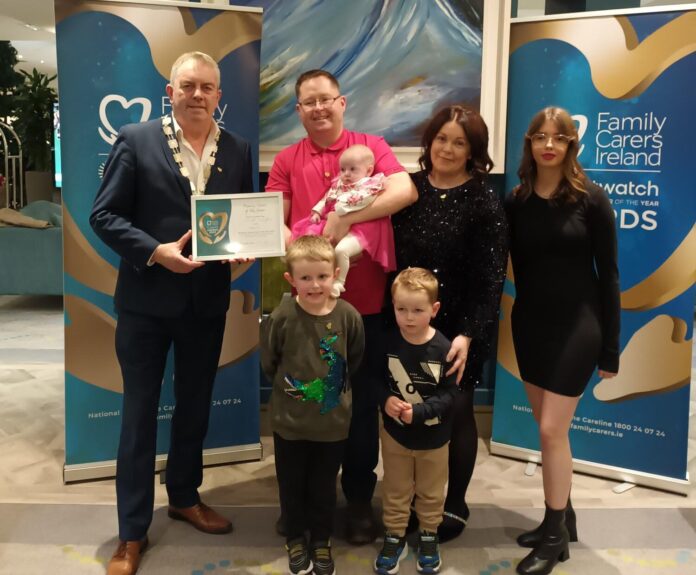
ATHEA man Joe O’Loughlin was celebrated at a national level for his work as a carer, having been named Netwatch Carer of the Year by Carers Ireland, the national charity supporting Ireland’s family carers.
Joe cares for his wife Donna, who lives with a traumatic brain injury, along with their three children, including Jacob (6), who is autistic and has ODD and ADHD, and Caleb (4), who faces multiple complex challenges including a brain injury, autism, epilepsy, scoliosis, and oral dysphagia.
Despite barely getting a few hours of sleep each night, Joe tirelessly supports his family, including his baby girl Precious, and is constantly on the road driving his loved ones to medical appointments and therapies across the country at Temple Street in Crumlin, Cork University Hospital, and University Hospital Kerry.
Known for his positivity and resilience, those who know Joe say he goes above and beyond every day to ensure the best for his family.

- External Walls: Up to €8,000 Grant
- Attic: Up to €1,500 Grant
- Cavity Walls: Up to €1,700 Grant
- Internal Dry Lining: Up to €4,500 Grant
Now in their 17th year, the Carer of the Year Awards honour all family carers, while shining a light on the urgent need for greater recognition and support of those who go above and beyond in caring for their loved ones – often without the necessary support from the State, including appropriate financial compensation, respite, and vital therapies for their loved ones.
There are over 500,000 family carers in Ireland caring for children or adults with additional needs, physical, or intellectual disabilities, frail older people, those with palliative care needs, or those living with chronic illnesses, mental health challenges, or addiction.
Family carers play a critical role and each week provide 19 million hours in unpaid work.
According to Carers Ireland, if the State were to seek to replace this support, it would cost €20billion annually.
Jean Ryan, local community support manager with Family Carers Ireland, highlighted the significance of the awards, saying that they “remind us of the vital role that family carers play in our society and shine a light on the incredible work that they do, which is too often unseen and unrecognised”.
“As a society, we must do much more to ensure that family carers are properly recognised, valued, and supported to care safely for their loved ones at home.”

